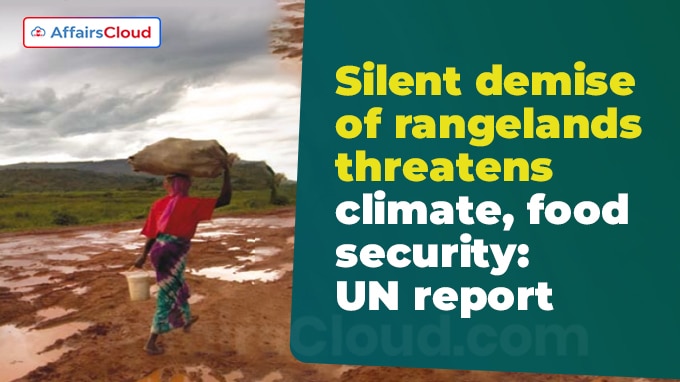 According to United Nations Convention to Combat Desertification’s (UNCCD) report titled “Global Land Outlook Thematic Report on Rangelands and Pastoralists” up to 50% of world’s vast rangelands are degraded and is nearly double the previous estimates that ranged from 20% to 35%.
According to United Nations Convention to Combat Desertification’s (UNCCD) report titled “Global Land Outlook Thematic Report on Rangelands and Pastoralists” up to 50% of world’s vast rangelands are degraded and is nearly double the previous estimates that ranged from 20% to 35%.
- This degradation is due to over-exploitation and misuse of natural pasturelands, and climate change and poses severe threat to food supply and the wellbeing or survival of billions of people.
- The report was released by UNCCD in Ulaanbaatar, Mongolia.
About Rangelands:
i.Rangelands is vast open land areas which consist of the natural grasslands used by livestock and wild animals for grazing purposes. For example: Savannas, Shrublands, Wetlands etc.
ii.These lands cover 80 million square kilometer of land i.e. 54% of all land on earth, account for 1/6th of global food production and represent nearly 33% of carbon reservoir on earth.
iii.Rangelands occupy about 121 million hectares in India and a large part (around 100 million hectares) of these is considered underutilized.
Economic Significance of Rangelands:
i.Livestock production accounts for 19% and 4% of Gross Domestic Product (GDP) of Ethiopia and India respectively.
ii.Brazil produces 16% of world’s Beef and cattle livestock generates about 1/3rd of its agribusiness GDP.
iii.Livestock production generates employment for around 80% of the population in many Western African states.
iv.Around 60% of the land area is used for grazing of rangelands in Central Asia and Mongolia as livestock-herding supports nearly 1/3rd of regions population.
Key Points:
i.The report highlights some key symptoms for degradation of rangelands, which contribute to droughts, precipitation fluctuations and biodiversity loss are: decrease of soil fertility and nutrients, soil erosion, increase in salinization and soil compaction which restricts plant growth, among others.
ii.The report outlines that degradation is mainly attributed by conversion of pastures to cropland and other land use changes due to urban population expansion, rapidly rising food and fuel demands, excessive grazing, abandonment (end of pastoralists), and policies that incentivizes over exploitation.
iii.The report ranked the world regions affected by rangelands degradation in descending order:
- Central Asia, China, Mongolia; North Africa and Near East; Sahel and West Africa; South America; East Africa, North America, Europe, South Africa and Australia.
iv.The report highlighted that around 120 million hectares of land in India is degraded due to water erosion (82 million hectares), wind erosion (12 million hectares), chemical contamination (25 million hectares), and physical degradation (1 million hectares).
Key Recommendations:
i.To integrate climate change mitigation and adaptation strategies with suitable management plans to increase carbon sequestration and storage.
ii.To avoid or prevent conversion of rangelands and other land use changes that decrease the diversity of rangelands, especially indigenous lands.
iii.To adopt and frame effective rangeland conversion measures within and outside protected areas that support biodiversity above and below ground.
iv.To adopts and promotes pastoralism-based strategies and practices that help to alleviate harms to rangeland health.
v.Countries should encourage supportive policies which also involves wider people’s participation for protection of rangelands.
Key Facts:
i.Rangelands cover 9.5 million square kilometer(sq km) of land area which constitutes 12% of protected rangelands globally.
ii.Livestock generates income for 1.2 billion people in developing countries living under the poverty threshold.
iii.Around 1 billion animals are maintained by pastoralists across more than 100 countries which support 200 million households and supply 10% of world’s meat.
iv.About 33% or 1/3rd of global biodiversity hotspots found in rangelands.
Additional Information:
i.Mongolia will host 17th UNCCD Conference of Parties (CoP) in 2026.
ii.United Nations General Assembly (UNGA) declared 2026 as International Year of Rangelands and Pastoralists (IYRP 2026), which was proposed by Mongolia in 2022.
About United Nations Convention to Combat Desertification (UNCCD):
Executive Secretary: Ibrahim Thiaw
Headquarters: Bonn, Germany
Established: 1994




